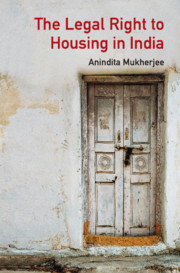Book contents
- Frontmatter
- Dedication
- Epigraph
- Contents
- Foreword
- Acknowledgements
- List of Abbreviations
- List of Cases
- List of Statutes
- Introduction
- 1 The Act of Definition
- 2 The Indian State in Response to Housing Claims
- 3 Mapping the Legal Environment
- Conclusions
- Annexure 1 Central Housing Law and Policy
- Annexure 2 National Campaign for Housing Rights
- Annexure 3 The National Right to Homestead Bill, 2013
- References
- Index
Introduction
Published online by Cambridge University Press: 26 April 2019
- Frontmatter
- Dedication
- Epigraph
- Contents
- Foreword
- Acknowledgements
- List of Abbreviations
- List of Cases
- List of Statutes
- Introduction
- 1 The Act of Definition
- 2 The Indian State in Response to Housing Claims
- 3 Mapping the Legal Environment
- Conclusions
- Annexure 1 Central Housing Law and Policy
- Annexure 2 National Campaign for Housing Rights
- Annexure 3 The National Right to Homestead Bill, 2013
- References
- Index
Summary
When lawyers study rights, one maxim that finds necessary mention is ubi jus ibi remedium —where there is a right, there is a remedy. This is to say that it is incumbent upon an equitable legal system to devise accessible remedies when rights are violated. Of course, seeing as this is a maxim developed in courts of law, the rights being referred to are legal rights. In common parlance, though, the term ‘right’ does not necessarily have a legal connotation; the Oxford English Dictionary, for instance, defines a right as ‘a moral or legal entitlement to have or do something’. Yet, often, when we speak of a moral right we seem to do so to make the case that the law is lacking morally unless it recognises and protects the right in question. This presumes that the concept of a moral right is of little significance in itself, except as a bargaining chip, and that incorporation into the law is a necessary and desirable consequence once it is agreed that a moral entitlement exists. The many struggles to include particular rights (like rights to education and food) and the rights of particular identities (for example, trans persons and persons with disabilities) within constitutional or statutory frameworks speak to this point.
The right to housing, with its deeply ambiguous position in Indian law, complicates in many ways our understanding of rights as such, and, more specifically, this seemingly direct link between moral and legal rights. Shelter has been recognised by Indian courts as a part of each person's right to life, but always in a rhetorical manner. Housing is not specifically mentioned in the schedule of the Constitution that details the subjects on which states, the Centre or both can legislate, ensuring that questions of jurisdiction plague all proposed legislative interventions. A large body of statutory law exists that can be, and has been, used to systematically deny people the right. Even as the moral right to housing is acknowledged across all limbs of government, it is impossible to tell at a glance whether there exists a legal right to housing in India, and what its contours are.
Much of the rights language evolved at a time when socio-economic rights were not given primacy as rights, leaving several situations open where it is difficult to fit said rights into existing conceptual categories.
- Type
- Chapter
- Information
- The Legal Right to Housing in India , pp. 1 - 18Publisher: Cambridge University PressPrint publication year: 2019



